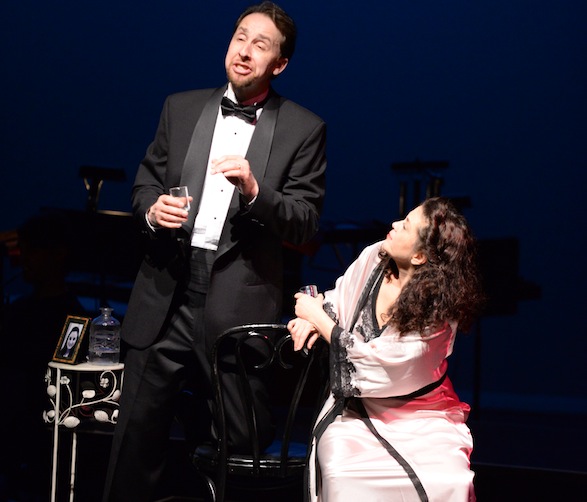Fuse Music Review: Emmanuel Music’s “A Little Night Music” — An Uneven Evening
With a Stephen Sondheim show, it’s all in the casting, and Emmanuel Music’s casting was a mixed bag.
A Little Night Music, staged by Emmanuel Music. Ryan Turner Artistic Director, Lynn Torgove, Stage Director. At the Boston Conservatory Theatre, Boston, MA, January 18 and 19.
By Debra Cash
What do Stephen Sondheim and Johann Sebastian Bach have in common?
That’s not a trick question. Emmanuel Music, the beloved ensemble that made its reputation with a commitment to perform Bach’s sacred cantatas “in the liturgical setting for which they were intended” stretched out this past weekend in a much-anticipated (and sold-out) semi-staged production of Stephen Sondheim’s musical A Little Night Music.
Emmanuel Music has done contemporary pieces — particularly cherishing the work of its principal guest conductor, composer John Harbison — but Broadway has not been the ensemble’s regular turf. Sondheim’s 1973 show, based on Ingmar Bergman’s 1955 film Smiles of a Summer Night, is titled after a well-known Mozart composition, which gets some whistled “name that tune” winks at one point in the staging. Broadway may be Broadway, but at Emmanuel Music the formal compositional structures are never ignored.
A Little Night Music is a comedy where sex and repression are constant concerns reinforced by issues of social expectation and fin-de-siecle status. The action concerns a successful lawyer, Frederik Egerman, married for the second time to an 18-year-old who hasn’t yet been willing to dispense with her virginity. In frustration, he turns to Desiree Armfeldt, a formerly glamorous actress with whom he had an affair years before. You can read the twists and turns of the plot here.
Lynn Torgove, the noted mezzo soprano (I would love to hear her Sorceress in Purcell’s Dido and Aeneas) took the directing responsibilities, establishing a series of raised islands at the edges and back of the onstage chamber orchestra, each outfitted with sparse furnishings, a bench here, a screen there. Placing the cast in and around the orchestra served to underline Sondheim’s dense interweaving of the highly colored orchestrations and the more astringent lyric-driven singing, but visually it created the unfortunate subtext of making the characters seem even more adrift than usual. There’s a long history of responding to Sondheim’s work as a gloss on Midsummer Night’s Dream — hey, everyone ends up with the person they should, just like in Shakespeare’s comedies — but on the crowded Boston Conservatory stage the violins ended up doubling as trees in an inadvertent Athenian woodland.
With a Sondheim show, it’s all in the casting, and Emmanuel Music’s casting was a mixed bag.
Bobbie Steinbach makes a great Madame Armfeldt, a world-weary grandmother with a martini-dry wit. Posed in her wheelchair, Madame Armfeldt is the brake and the corrective to the family’s ditsy lust. Having seen it all and done it all with a lot more class than the generation she surveys, she sings “Liaisons! What’s happened to them?…/ Women, it/ Pains me more than I can say/ The lack of taste that they display!” (Okay it’s not fair to compare anyone to the then-85 year old Angela Lansbury, but here is a great opportunity to experience her performance.) After Madame Armsfeldt displays the force of her personality, everyone else is counted a straggler.
Torgove has the right degree of tarnish and regret as Desiree Armfeldt, but her Desiree was all reaction and too little agency, much less hard-won wisdom. Even the one show-stopper in the musical — the “song full of questions” Send in the Clowns — was presented wistfully by Torgove, almost as if she was singing it to herself. It didn’t help that, as Fredrik Egerman, David Kravitz seemed like the kind of guy who says all the right self-deprecating things when he wants to get what he wants, but doesn’t believe them for a minute. Kravitz, one of Boston’s most reliable baritones, has a sonorous voice and technique to spare — there wasn’t a lyric muddled or a note dropped — but after a while his Egerman came off as merely pompous. Among the supporting roles, Boston Conservatory sophomore Kellie McKay’s uninhibited maid, Petra, made a nice contrast to her mistress Anne (Kristen Watson)’s uptight demeanor, and had an ardent singing voice that, if miked, would be right at home in Rent.
But when it comes to sheer musical intention, the Emmanuel crew know what they’re doing. In the ensembles (the masterful, slight-of-hand dexterity for the first act closer “Weekend in the Country”) and the writing for the Greek — or is it Swedish? — chorus known collectively as the Liebeslieder Quintet, Sondheim was well served. As Madame Armfeldt could have told you, the second best champagne is still champagne.
Debra Cash has reported, taught and lectured on dance, performing arts, design and cultural policy for print, broadcast and internet media. She regularly presents pre-concert talks, writes program notes and moderates events sponsored by World Music/CRASHarts and cultural venues throughout New England. A former Boston Globe and WBUR dance critic, she is a two-time winner of the Creative Arts Award for poetry from the Hadassah-Brandeis Institute and will return to the 2014 Bates Dance Festival as Scholar in Residence.
c 2013 Debra Cash


